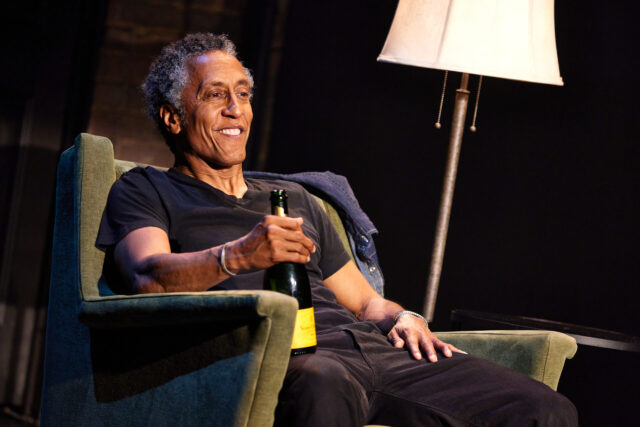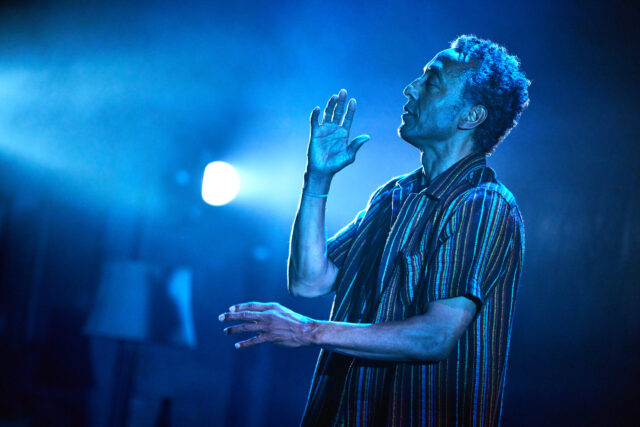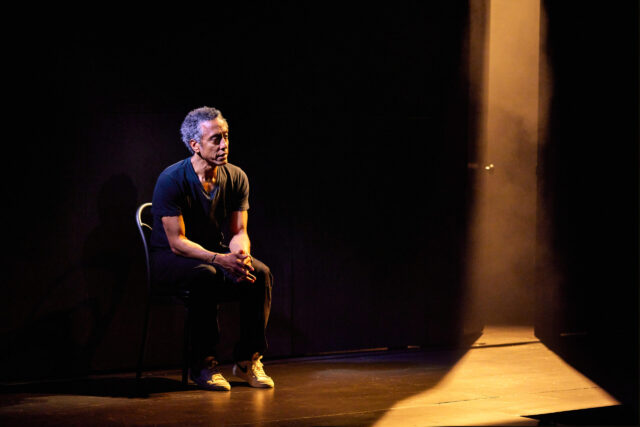
Andre Royo plays multiple addicts in revival of Eric Bogosian’s Drinking in America (photo by Jeremy Daniel)
DRINKING IN AMERICA
Audible Theater’s Minetta Lane Theatre
18 Minetta Lane between Sixth Ave. and MacDougal St.
Monday – Saturday through April 13, $53-$98
drinkinginamericaplay.com
www.audible.com
In “Fried-Egg Deal,” the last of twelve monologues that comprise Eric Bogosian’s Drinking in America, a loaded man says to the audience, “I’m a good-for-nothin’ drunken bum, you shouldn’t even look at me.”
Written and first performed by Bogosian in 1986 when he was eighteen months sober, having kicked alcohol and hard drugs, Drinking in America examines different forms of addiction as a variety of characters attempt to be seen, on city streets, in hotel rooms, at work, and in theater itself.
The play is now being revived by Audible at the Minetta Lane, starring Bronx-born Andre Royo and directed by Mark Armstrong. Royo, who played Reginald “Bubbles” Cousins on The Wire, Mayor Robert “Bobo” Boston on Hand of God, and Thirsty Rawlings on Empire, originally wanted to do Bogosian’s Talk Radio, but rights issues led him instead to Drinking in America, which has a personal connection, as he is currently about eighteen months sober himself.
I did not see the original 1986 production at the American Place Theater, which earned Bogosian an Obie for Best Play and a Drama Desk Award for Outstanding Solo Performance. But this past January, I attended a benefit for the Chain Theatre at which Bogosian presented several pieces from the play as part of “An Evening with Eric Bogosian: Monologues, Digressions, and Air Guitar.” In addition, on Bogosian’s “100 Monologues” website, I’ve watched such actors as Bill Irwin, Sam Rockwell, Brian d’Arcy James, Dylan Baker, Anson Mount, Michael Shannon, and Marin Ireland perform scenes from the show.
Royo makes the play his own from the opening moment, when he introduces himself to the audience and ad-libs about who he is and where he is from. After a few minutes of personal banter, he segues into the narrative, which begins with “Journal,” reading the April 11, 1987, entry. “Today I began to understand one of the immutable truths with regard to my own existence,” he shares. “Today I discovered that I am not a being surrounded by walls and barriers but part of a continuum with all other things, those living and even those inanimate. I feel a new surge of desire for life, for living now, for getting out and becoming part of everything around me. I want to change the world and I know I can do it. I’m like a newborn baby taking his first steps. I was blind before to my inner self, my true desires, my own special powers and the universe itself. So many people live lives of pointless desperation, unable to appreciate that life is life to be lived for today, in every flower, in a cloud . . . in a smile.”

Andre Royo stars in Audible revival of Eric Bogosian’s 1986 solo show (photo by Jeremy Daniel)
While it sounds like it could be the memories of a man who has cleaned himself up and has a new lease on life, it quickly descends into a drug-fueled tale in which the man reconsiders his own importance. “I was literally on top of the world. I felt like GOD,” he declares. What follows are the stories of eleven more men addicted to drugs, alcohol, power, prestige, money, and sex, each with a tenuous grasp on reality. Royo fluently shifts from character to character, with changes in speech, body movement, and, minimally, costumes, as each man makes his case. They stumble across the stage, swing bottles around, and get into confrontations, lost in the haze of addiction. Kristen Robinson’s set features a few chairs, a table, a lamp, and a dark back wall with a doorway that beckons to another state of mind, a proverbial light at the end of the tunnel (or an entrance to hell?). The costumes are by Sarita Fellows, with sound by John Gromada and lighting by Jeff Croiter.
In “American Dreamer,” a street drunk yells out that he has a bevy of fancy cars and lovely ladies. In “Wired,” a Hollywood player snorts coke and swizzles booze in the morning as he talks on the phone about the availability of Lee Marvin or Richard Chamberlain for an upcoming film. (Although Bogosian has made small tweaks for Audible, which will be releasing an audio version of the show, he has left in the original references.)
In “Commercial,” a voice-over actor is pitching an upscale beer, narrating, “You’ve worked hard to get where you are today and you’ve still got a long way to go before you get to the top . . . You want your life to be good . . . so you surround yourself with the best . . . the very best . . . in clothes, in food, in people . . . You know you’re going to get there someday . . . and when you do, you’ll say ‘good-bye’ to your companions of a less prosperous time. But there is one thing you will never leave behind . . . And that’s your beer: Krönenbräu . . . The beer of kings.” Beer commercials make all kinds of promises, but as the characters in Drinking in America reveal to us, what booze often delivers is something else.
In “No Problems,” the character tries to assure us, and himself, “I have no problems. I’m happy with life. Things are fine as far as I’m concerned. I know some people have problems, some people have quite a few. I, fortunately, have none.” The monologue implicates the audience, speaking to all those in the theater who believe they are not like anyone they have seen onstage, that none of that could happen to them, since they’re satisfied with their existence.
Not only has Royo struggled with addiction but his Wire costar Michael K. Williams, despite all his professional success, died of an overdose in September 2021 at the age of fifty-four. No one is invulnerable. In “Godhead,” a tough-talking man claims, “I just wanna live my life. I don’t hurt nobody.” But addiction affects more than just the addict.

Andre Royo pauses to examine addiction and demons in Drinking in America at the Minetta Lane (photo by Jeremy Daniel)
Nearly forty years after its debut, Drinking in America still feels fresh and relevant. The toll of alcoholism and drug addiction grew even greater during the recent pandemic and its concurrent isolation, and there’s no end in sight. It hurts families, destroys relationships, impacts careers, and keeps men and women from reaching their potentials. Each vignette is straightforward and direct, with Royo skillfully depicting the characters, giving them unique idiosyncrasies and attributes, but in many ways they are similar as well. And, as Bogosian (subUrbia, Pounding Nails in the Floor with My Forehead) and Royo make clear, they are us, and we are them.
In “The Law,” a preacher asks, “What has happened to our country? Will somebody answer that question for me, please? We are in trouble. We are in serious trouble. Look around you, what do you see?” We might not be seeing the same world the preacher does — he rails against “crime, perversion, decay, apathy,” and abortion, proclaiming that “we are living in a nightmare” — but we are asking the same questions.
The eighty-minute play is adroitly directed by Armstrong (The Angel in the Trees, The Most Damaging Wound) and wonderfully performed by Royo, who fully inhabits each of the characters he portrays, some of whom he, as a recovering alcoholic, can specifically relate to. In addition, because he’s Black, the show has an additional edge as it tackles toxic masculinity and male fragility, terms that were not household words in 1986, although race has taken on an expanded meaning in recent years.
Unfortunately, many of the same sociopolitical issues are still affecting America, from racial inequality and injustice to immigration reform and religious hatred. It’s always too easy to just look away, saying to ourselves, “I have no problems. None. I’m happy. I’m healthy. I love my wife, I love my kid . . . good job . . . no problems. That’s what it’s all about . . . I guess.”